Accounting Analysis: Sustainability Reporting in Wesfarmers Limited
VerifiedAdded on 2022/08/31
|6
|1437
|26
Report
AI Summary
This report provides a comprehensive analysis of sustainability reporting in Wesfarmers Limited. It examines the application of key accounting theories such as stakeholder theory, legitimacy theory, and agency theory to the company's sustainability reporting practices. The report identifies and discusses various issues relevant to sustainability reporting in the Australian context, including the adoption of different reporting frameworks, the identification of target audiences, and the development of effective reporting strategies. The research employs a qualitative methodology, analyzing data from Wesfarmers' annual reports and website to address specific research questions. These questions explore the frameworks adopted, target audiences, sustainability issues addressed, and reporting strategies followed by Wesfarmers. The conceptual, theoretical, methodological, and analytical frameworks are outlined, providing a structured approach to the research. The report concludes by referencing the sources used, including Wesfarmers' annual reports and website, to provide a thorough overview of the company's sustainability reporting mechanisms.
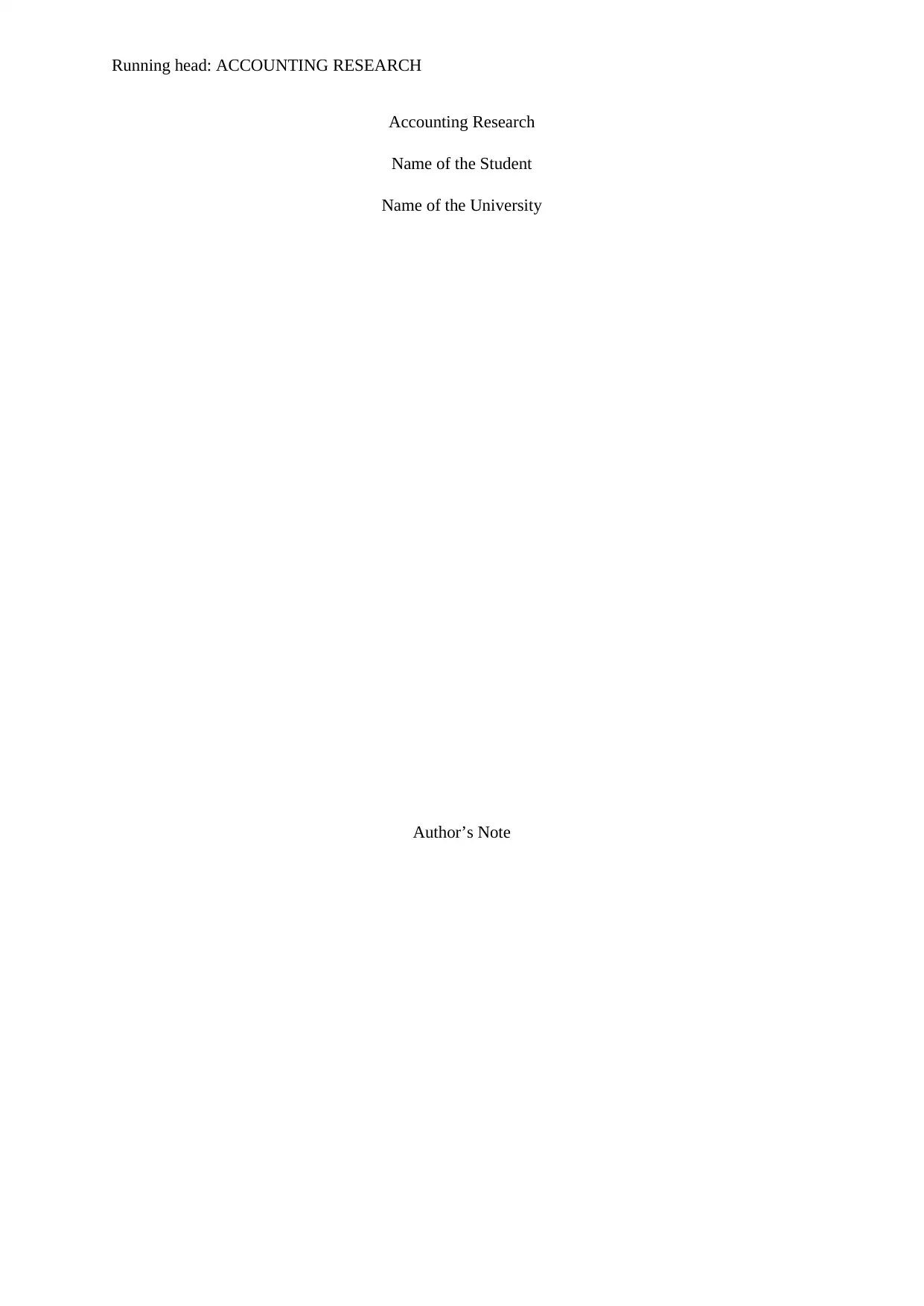
Running head: ACCOUNTING RESEARCH
Accounting Research
Name of the Student
Name of the University
Author’s Note
Accounting Research
Name of the Student
Name of the University
Author’s Note
Paraphrase This Document
Need a fresh take? Get an instant paraphrase of this document with our AI Paraphraser
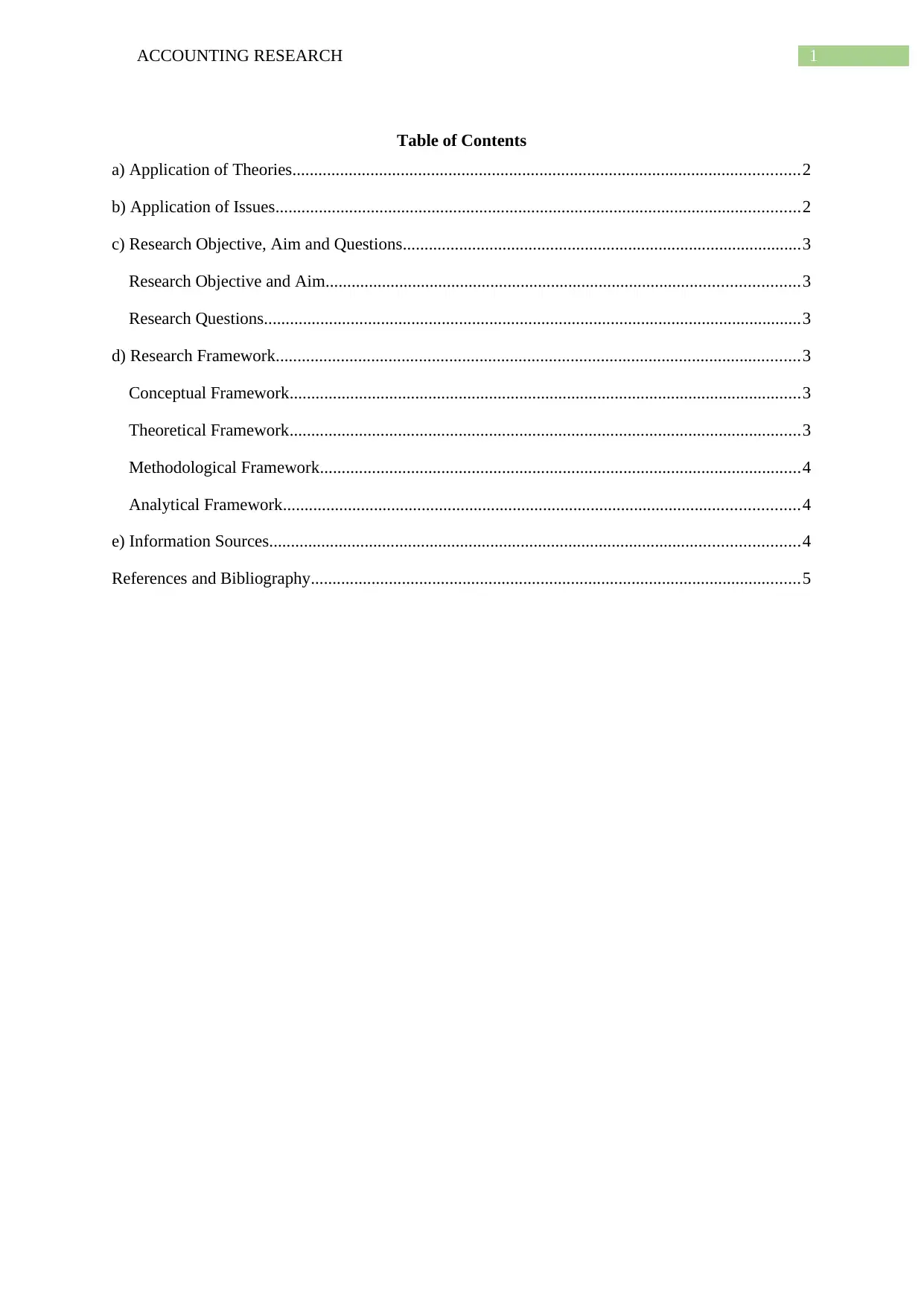
1ACCOUNTING RESEARCH
Table of Contents
a) Application of Theories.....................................................................................................................2
b) Application of Issues.........................................................................................................................2
c) Research Objective, Aim and Questions............................................................................................3
Research Objective and Aim.............................................................................................................3
Research Questions............................................................................................................................3
d) Research Framework.........................................................................................................................3
Conceptual Framework......................................................................................................................3
Theoretical Framework......................................................................................................................3
Methodological Framework...............................................................................................................4
Analytical Framework.......................................................................................................................4
e) Information Sources..........................................................................................................................4
References and Bibliography.................................................................................................................5
Table of Contents
a) Application of Theories.....................................................................................................................2
b) Application of Issues.........................................................................................................................2
c) Research Objective, Aim and Questions............................................................................................3
Research Objective and Aim.............................................................................................................3
Research Questions............................................................................................................................3
d) Research Framework.........................................................................................................................3
Conceptual Framework......................................................................................................................3
Theoretical Framework......................................................................................................................3
Methodological Framework...............................................................................................................4
Analytical Framework.......................................................................................................................4
e) Information Sources..........................................................................................................................4
References and Bibliography.................................................................................................................5
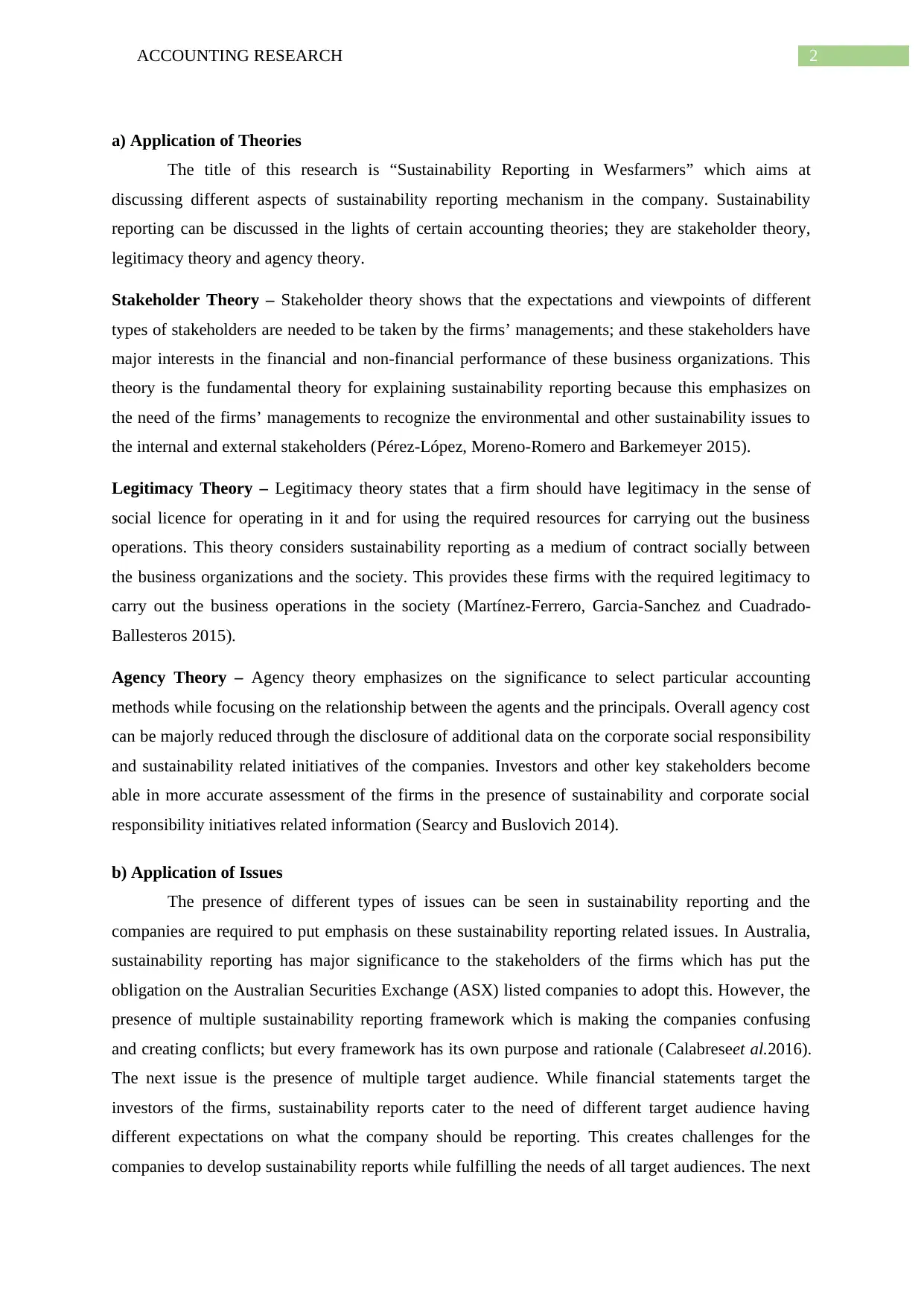
2ACCOUNTING RESEARCH
a) Application of Theories
The title of this research is “Sustainability Reporting in Wesfarmers” which aims at
discussing different aspects of sustainability reporting mechanism in the company. Sustainability
reporting can be discussed in the lights of certain accounting theories; they are stakeholder theory,
legitimacy theory and agency theory.
Stakeholder Theory – Stakeholder theory shows that the expectations and viewpoints of different
types of stakeholders are needed to be taken by the firms’ managements; and these stakeholders have
major interests in the financial and non-financial performance of these business organizations. This
theory is the fundamental theory for explaining sustainability reporting because this emphasizes on
the need of the firms’ managements to recognize the environmental and other sustainability issues to
the internal and external stakeholders (Pérez‐López, Moreno‐Romero and Barkemeyer 2015).
Legitimacy Theory – Legitimacy theory states that a firm should have legitimacy in the sense of
social licence for operating in it and for using the required resources for carrying out the business
operations. This theory considers sustainability reporting as a medium of contract socially between
the business organizations and the society. This provides these firms with the required legitimacy to
carry out the business operations in the society (Martínez‐Ferrero, Garcia‐Sanchez and Cuadrado‐
Ballesteros 2015).
Agency Theory – Agency theory emphasizes on the significance to select particular accounting
methods while focusing on the relationship between the agents and the principals. Overall agency cost
can be majorly reduced through the disclosure of additional data on the corporate social responsibility
and sustainability related initiatives of the companies. Investors and other key stakeholders become
able in more accurate assessment of the firms in the presence of sustainability and corporate social
responsibility initiatives related information (Searcy and Buslovich 2014).
b) Application of Issues
The presence of different types of issues can be seen in sustainability reporting and the
companies are required to put emphasis on these sustainability reporting related issues. In Australia,
sustainability reporting has major significance to the stakeholders of the firms which has put the
obligation on the Australian Securities Exchange (ASX) listed companies to adopt this. However, the
presence of multiple sustainability reporting framework which is making the companies confusing
and creating conflicts; but every framework has its own purpose and rationale (Calabreseet al.2016).
The next issue is the presence of multiple target audience. While financial statements target the
investors of the firms, sustainability reports cater to the need of different target audience having
different expectations on what the company should be reporting. This creates challenges for the
companies to develop sustainability reports while fulfilling the needs of all target audiences. The next
a) Application of Theories
The title of this research is “Sustainability Reporting in Wesfarmers” which aims at
discussing different aspects of sustainability reporting mechanism in the company. Sustainability
reporting can be discussed in the lights of certain accounting theories; they are stakeholder theory,
legitimacy theory and agency theory.
Stakeholder Theory – Stakeholder theory shows that the expectations and viewpoints of different
types of stakeholders are needed to be taken by the firms’ managements; and these stakeholders have
major interests in the financial and non-financial performance of these business organizations. This
theory is the fundamental theory for explaining sustainability reporting because this emphasizes on
the need of the firms’ managements to recognize the environmental and other sustainability issues to
the internal and external stakeholders (Pérez‐López, Moreno‐Romero and Barkemeyer 2015).
Legitimacy Theory – Legitimacy theory states that a firm should have legitimacy in the sense of
social licence for operating in it and for using the required resources for carrying out the business
operations. This theory considers sustainability reporting as a medium of contract socially between
the business organizations and the society. This provides these firms with the required legitimacy to
carry out the business operations in the society (Martínez‐Ferrero, Garcia‐Sanchez and Cuadrado‐
Ballesteros 2015).
Agency Theory – Agency theory emphasizes on the significance to select particular accounting
methods while focusing on the relationship between the agents and the principals. Overall agency cost
can be majorly reduced through the disclosure of additional data on the corporate social responsibility
and sustainability related initiatives of the companies. Investors and other key stakeholders become
able in more accurate assessment of the firms in the presence of sustainability and corporate social
responsibility initiatives related information (Searcy and Buslovich 2014).
b) Application of Issues
The presence of different types of issues can be seen in sustainability reporting and the
companies are required to put emphasis on these sustainability reporting related issues. In Australia,
sustainability reporting has major significance to the stakeholders of the firms which has put the
obligation on the Australian Securities Exchange (ASX) listed companies to adopt this. However, the
presence of multiple sustainability reporting framework which is making the companies confusing
and creating conflicts; but every framework has its own purpose and rationale (Calabreseet al.2016).
The next issue is the presence of multiple target audience. While financial statements target the
investors of the firms, sustainability reports cater to the need of different target audience having
different expectations on what the company should be reporting. This creates challenges for the
companies to develop sustainability reports while fulfilling the needs of all target audiences. The next
⊘ This is a preview!⊘
Do you want full access?
Subscribe today to unlock all pages.

Trusted by 1+ million students worldwide
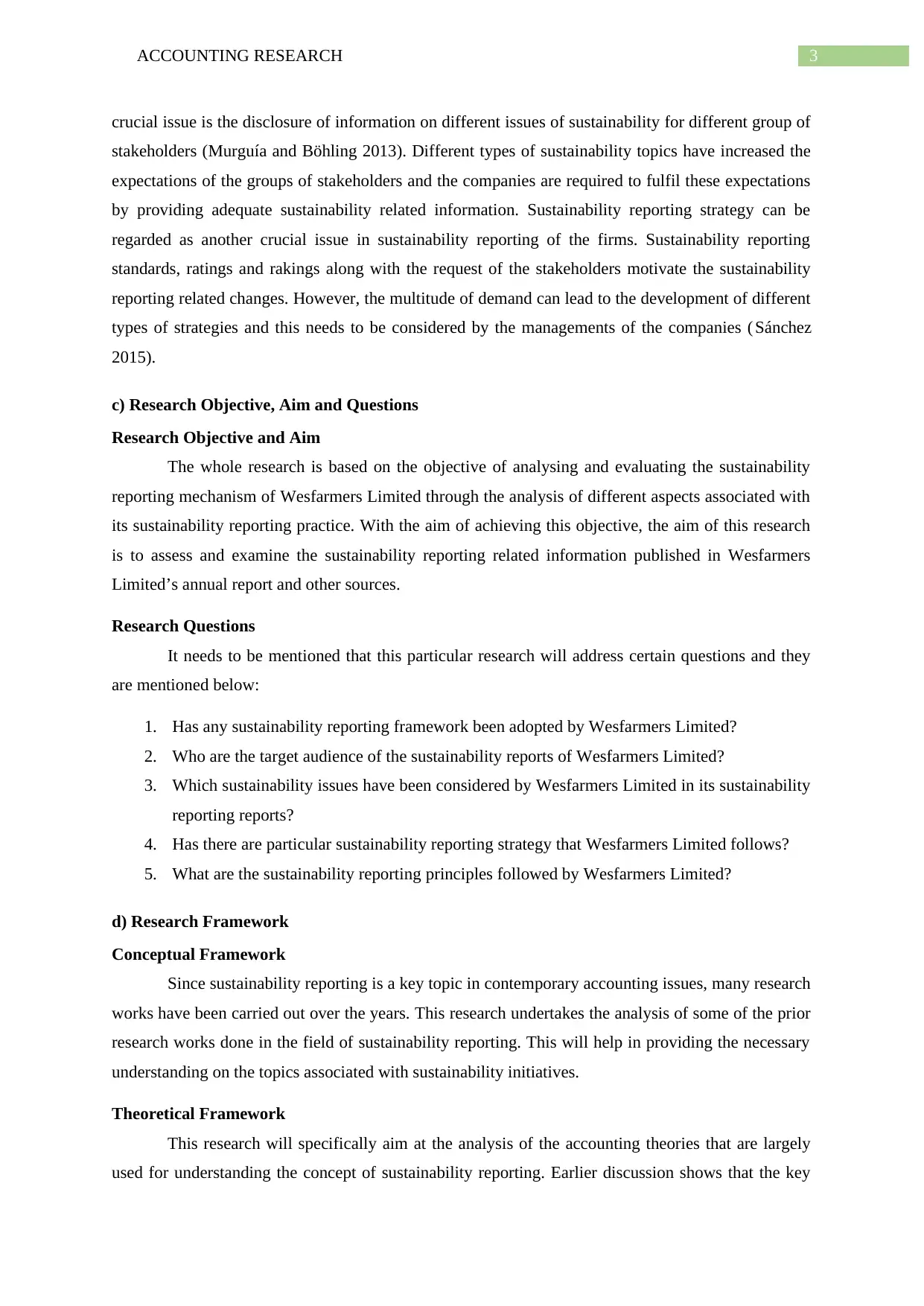
3ACCOUNTING RESEARCH
crucial issue is the disclosure of information on different issues of sustainability for different group of
stakeholders (Murguía and Böhling 2013). Different types of sustainability topics have increased the
expectations of the groups of stakeholders and the companies are required to fulfil these expectations
by providing adequate sustainability related information. Sustainability reporting strategy can be
regarded as another crucial issue in sustainability reporting of the firms. Sustainability reporting
standards, ratings and rakings along with the request of the stakeholders motivate the sustainability
reporting related changes. However, the multitude of demand can lead to the development of different
types of strategies and this needs to be considered by the managements of the companies ( Sánchez
2015).
c) Research Objective, Aim and Questions
Research Objective and Aim
The whole research is based on the objective of analysing and evaluating the sustainability
reporting mechanism of Wesfarmers Limited through the analysis of different aspects associated with
its sustainability reporting practice. With the aim of achieving this objective, the aim of this research
is to assess and examine the sustainability reporting related information published in Wesfarmers
Limited’s annual report and other sources.
Research Questions
It needs to be mentioned that this particular research will address certain questions and they
are mentioned below:
1. Has any sustainability reporting framework been adopted by Wesfarmers Limited?
2. Who are the target audience of the sustainability reports of Wesfarmers Limited?
3. Which sustainability issues have been considered by Wesfarmers Limited in its sustainability
reporting reports?
4. Has there are particular sustainability reporting strategy that Wesfarmers Limited follows?
5. What are the sustainability reporting principles followed by Wesfarmers Limited?
d) Research Framework
Conceptual Framework
Since sustainability reporting is a key topic in contemporary accounting issues, many research
works have been carried out over the years. This research undertakes the analysis of some of the prior
research works done in the field of sustainability reporting. This will help in providing the necessary
understanding on the topics associated with sustainability initiatives.
Theoretical Framework
This research will specifically aim at the analysis of the accounting theories that are largely
used for understanding the concept of sustainability reporting. Earlier discussion shows that the key
crucial issue is the disclosure of information on different issues of sustainability for different group of
stakeholders (Murguía and Böhling 2013). Different types of sustainability topics have increased the
expectations of the groups of stakeholders and the companies are required to fulfil these expectations
by providing adequate sustainability related information. Sustainability reporting strategy can be
regarded as another crucial issue in sustainability reporting of the firms. Sustainability reporting
standards, ratings and rakings along with the request of the stakeholders motivate the sustainability
reporting related changes. However, the multitude of demand can lead to the development of different
types of strategies and this needs to be considered by the managements of the companies ( Sánchez
2015).
c) Research Objective, Aim and Questions
Research Objective and Aim
The whole research is based on the objective of analysing and evaluating the sustainability
reporting mechanism of Wesfarmers Limited through the analysis of different aspects associated with
its sustainability reporting practice. With the aim of achieving this objective, the aim of this research
is to assess and examine the sustainability reporting related information published in Wesfarmers
Limited’s annual report and other sources.
Research Questions
It needs to be mentioned that this particular research will address certain questions and they
are mentioned below:
1. Has any sustainability reporting framework been adopted by Wesfarmers Limited?
2. Who are the target audience of the sustainability reports of Wesfarmers Limited?
3. Which sustainability issues have been considered by Wesfarmers Limited in its sustainability
reporting reports?
4. Has there are particular sustainability reporting strategy that Wesfarmers Limited follows?
5. What are the sustainability reporting principles followed by Wesfarmers Limited?
d) Research Framework
Conceptual Framework
Since sustainability reporting is a key topic in contemporary accounting issues, many research
works have been carried out over the years. This research undertakes the analysis of some of the prior
research works done in the field of sustainability reporting. This will help in providing the necessary
understanding on the topics associated with sustainability initiatives.
Theoretical Framework
This research will specifically aim at the analysis of the accounting theories that are largely
used for understanding the concept of sustainability reporting. Earlier discussion shows that the key
Paraphrase This Document
Need a fresh take? Get an instant paraphrase of this document with our AI Paraphraser
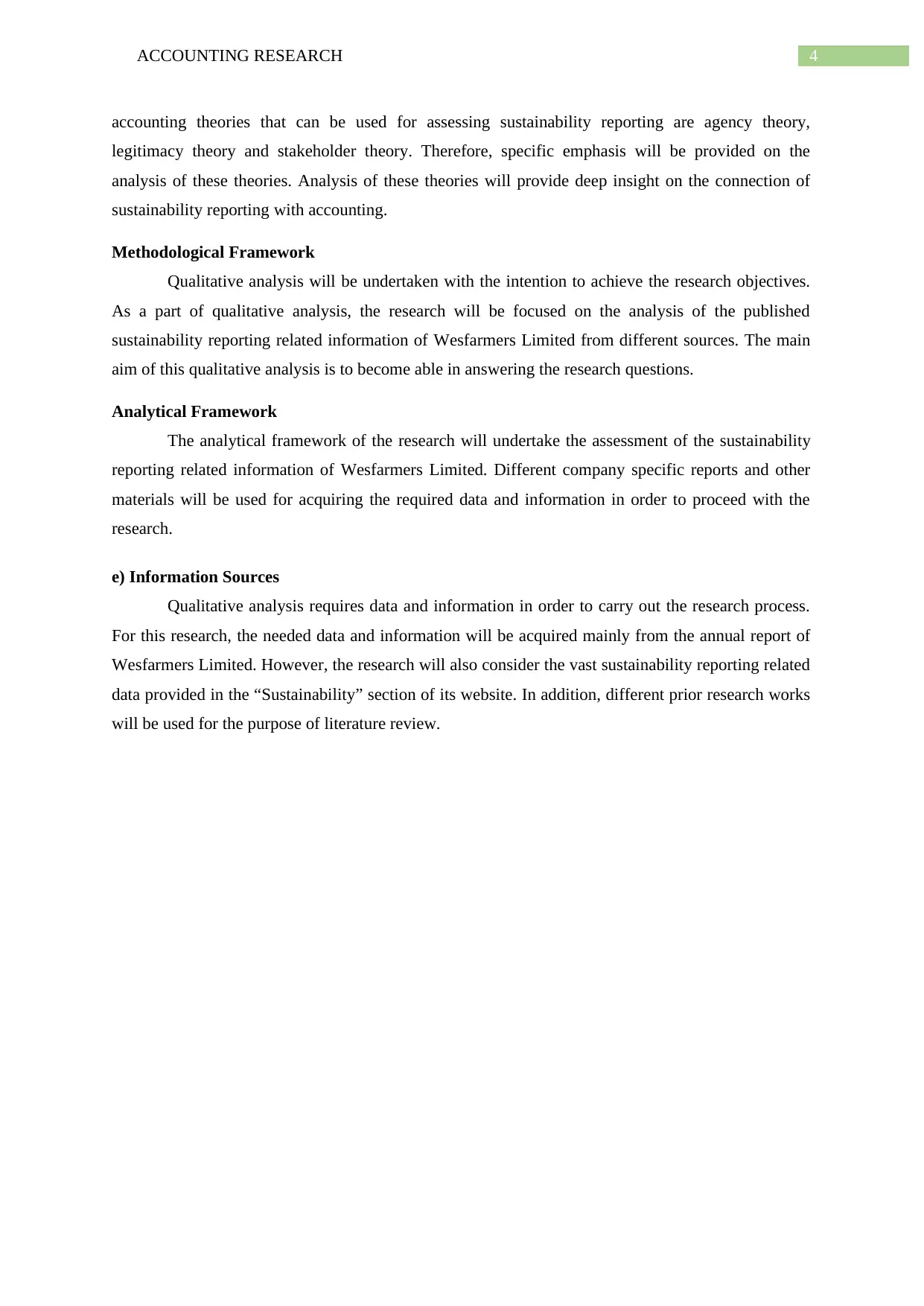
4ACCOUNTING RESEARCH
accounting theories that can be used for assessing sustainability reporting are agency theory,
legitimacy theory and stakeholder theory. Therefore, specific emphasis will be provided on the
analysis of these theories. Analysis of these theories will provide deep insight on the connection of
sustainability reporting with accounting.
Methodological Framework
Qualitative analysis will be undertaken with the intention to achieve the research objectives.
As a part of qualitative analysis, the research will be focused on the analysis of the published
sustainability reporting related information of Wesfarmers Limited from different sources. The main
aim of this qualitative analysis is to become able in answering the research questions.
Analytical Framework
The analytical framework of the research will undertake the assessment of the sustainability
reporting related information of Wesfarmers Limited. Different company specific reports and other
materials will be used for acquiring the required data and information in order to proceed with the
research.
e) Information Sources
Qualitative analysis requires data and information in order to carry out the research process.
For this research, the needed data and information will be acquired mainly from the annual report of
Wesfarmers Limited. However, the research will also consider the vast sustainability reporting related
data provided in the “Sustainability” section of its website. In addition, different prior research works
will be used for the purpose of literature review.
accounting theories that can be used for assessing sustainability reporting are agency theory,
legitimacy theory and stakeholder theory. Therefore, specific emphasis will be provided on the
analysis of these theories. Analysis of these theories will provide deep insight on the connection of
sustainability reporting with accounting.
Methodological Framework
Qualitative analysis will be undertaken with the intention to achieve the research objectives.
As a part of qualitative analysis, the research will be focused on the analysis of the published
sustainability reporting related information of Wesfarmers Limited from different sources. The main
aim of this qualitative analysis is to become able in answering the research questions.
Analytical Framework
The analytical framework of the research will undertake the assessment of the sustainability
reporting related information of Wesfarmers Limited. Different company specific reports and other
materials will be used for acquiring the required data and information in order to proceed with the
research.
e) Information Sources
Qualitative analysis requires data and information in order to carry out the research process.
For this research, the needed data and information will be acquired mainly from the annual report of
Wesfarmers Limited. However, the research will also consider the vast sustainability reporting related
data provided in the “Sustainability” section of its website. In addition, different prior research works
will be used for the purpose of literature review.
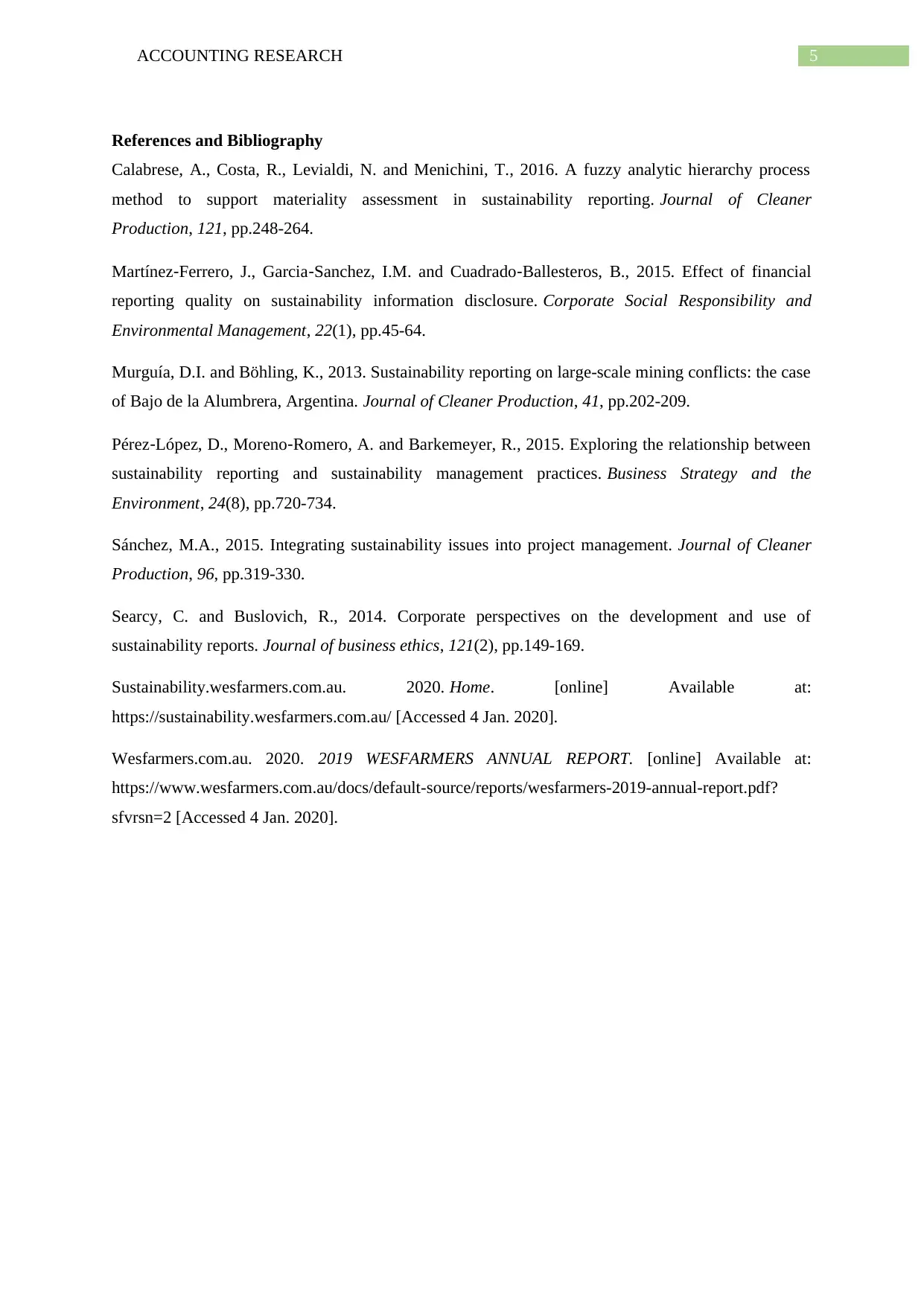
5ACCOUNTING RESEARCH
References and Bibliography
Calabrese, A., Costa, R., Levialdi, N. and Menichini, T., 2016. A fuzzy analytic hierarchy process
method to support materiality assessment in sustainability reporting. Journal of Cleaner
Production, 121, pp.248-264.
Martínez‐Ferrero, J., Garcia‐Sanchez, I.M. and Cuadrado‐Ballesteros, B., 2015. Effect of financial
reporting quality on sustainability information disclosure. Corporate Social Responsibility and
Environmental Management, 22(1), pp.45-64.
Murguía, D.I. and Böhling, K., 2013. Sustainability reporting on large-scale mining conflicts: the case
of Bajo de la Alumbrera, Argentina. Journal of Cleaner Production, 41, pp.202-209.
Pérez‐López, D., Moreno‐Romero, A. and Barkemeyer, R., 2015. Exploring the relationship between
sustainability reporting and sustainability management practices. Business Strategy and the
Environment, 24(8), pp.720-734.
Sánchez, M.A., 2015. Integrating sustainability issues into project management. Journal of Cleaner
Production, 96, pp.319-330.
Searcy, C. and Buslovich, R., 2014. Corporate perspectives on the development and use of
sustainability reports. Journal of business ethics, 121(2), pp.149-169.
Sustainability.wesfarmers.com.au. 2020. Home. [online] Available at:
https://sustainability.wesfarmers.com.au/ [Accessed 4 Jan. 2020].
Wesfarmers.com.au. 2020. 2019 WESFARMERS ANNUAL REPORT. [online] Available at:
https://www.wesfarmers.com.au/docs/default-source/reports/wesfarmers-2019-annual-report.pdf?
sfvrsn=2 [Accessed 4 Jan. 2020].
References and Bibliography
Calabrese, A., Costa, R., Levialdi, N. and Menichini, T., 2016. A fuzzy analytic hierarchy process
method to support materiality assessment in sustainability reporting. Journal of Cleaner
Production, 121, pp.248-264.
Martínez‐Ferrero, J., Garcia‐Sanchez, I.M. and Cuadrado‐Ballesteros, B., 2015. Effect of financial
reporting quality on sustainability information disclosure. Corporate Social Responsibility and
Environmental Management, 22(1), pp.45-64.
Murguía, D.I. and Böhling, K., 2013. Sustainability reporting on large-scale mining conflicts: the case
of Bajo de la Alumbrera, Argentina. Journal of Cleaner Production, 41, pp.202-209.
Pérez‐López, D., Moreno‐Romero, A. and Barkemeyer, R., 2015. Exploring the relationship between
sustainability reporting and sustainability management practices. Business Strategy and the
Environment, 24(8), pp.720-734.
Sánchez, M.A., 2015. Integrating sustainability issues into project management. Journal of Cleaner
Production, 96, pp.319-330.
Searcy, C. and Buslovich, R., 2014. Corporate perspectives on the development and use of
sustainability reports. Journal of business ethics, 121(2), pp.149-169.
Sustainability.wesfarmers.com.au. 2020. Home. [online] Available at:
https://sustainability.wesfarmers.com.au/ [Accessed 4 Jan. 2020].
Wesfarmers.com.au. 2020. 2019 WESFARMERS ANNUAL REPORT. [online] Available at:
https://www.wesfarmers.com.au/docs/default-source/reports/wesfarmers-2019-annual-report.pdf?
sfvrsn=2 [Accessed 4 Jan. 2020].
⊘ This is a preview!⊘
Do you want full access?
Subscribe today to unlock all pages.

Trusted by 1+ million students worldwide
1 out of 6
Related Documents
Your All-in-One AI-Powered Toolkit for Academic Success.
+13062052269
info@desklib.com
Available 24*7 on WhatsApp / Email
![[object Object]](/_next/static/media/star-bottom.7253800d.svg)
Unlock your academic potential
Copyright © 2020–2026 A2Z Services. All Rights Reserved. Developed and managed by ZUCOL.





